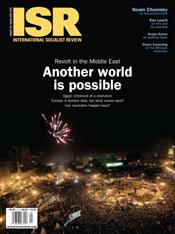Embedded novelists in an imperial state

The Mythology of Imperialism:
Jonah Raskin’s Mythology of Imperialism, first published in 1971, is very much a product of its time. It is suffused with the expansive energy and aspirations of the mass social movements against empire that swept the world in the 1960s. But it is also marred by the period’s blind spots, such as misplaced illusions in Third World rulers like Mao and Castro, the absence of women, and a tendency to see “letting it all hang out” and “dropping out” as revolutionary acts.
But the book nonetheless is still relevant and important today, and refreshing in the academic context. While teaching at SUNY Stony Brook, Raskin was no scholar removed from the messy world of politics, as he describes in his introduction:
I was arrested in 1968 along with nearly 800 students at Columbia, and twice in 1969, once again at Columbia and then in midtown Manhattan, where I was beaten by police officers on the street, and later in the 17th Precinct until my whole body was black and blue.
These encounters with the state, along with his allegiance to Marxism, form the bedrock of the book, which defiantly rejects the rules and restrictions of academic publishing.
Raskin broke new ground by analyzing the influence of imperialism on the British novel. Trailing behind social consciousness, the English departments of the 1960s were dominated by Cold War conservatism masquerading as “objectivity,” and literature was studied in isolation from history and politics.
Edward Said acknowledged Raskin as a crucial inspiration for his 1978 work Orientalism, which helped establish the now influential field of postcolonial studies.
An academic today is unlikely to be denied tenure, as Raskin was, for arguing that Rudyard Kipling, Joseph Conrad, E.M Forster, and Joyce Cary were shaped by the British Empire. But one is just as likely to face censure for going beyond abstract theorizing to launch any substantive challenge to the power structure, as Norman Finkelstein, Margo Ramlal-Nankoe, Loretta Capeheart, and many others can testify.
Unlike much postcolonial criticism today, Raskin is concerned with the present as much as the past:
I have been conscious throughout of America inheriting the mantle of British imperialism: standing inside one declining empire, writing about the fall of another empire. I decided to write about imperialism because that is the total reality of our time. This book is an attack on the empire, a weapon for the revolution.
While Raskin sees the American war on Vietnam behind British colonialism in Africa and Asia, his descriptions of the colonizer’s paranoid hatred resonates with today’s “war on terror”: “They created the image of the brutal Indian to justify their own brutality. They built a Frankenstein which turned against them”; “Kipling’s Indian characters are…men continually suspected of planning rebellion. They are rounded up, savagely beaten and tortured and held guilty of conspiracy to spread hatred of the white man.”
While Raskin reveals how imperialism is deeply embedded in culture, he is also interested in the ways that literature not only endorses but also may expose or challenge central tenets of ruling-class ideology, and can reveal society’s underlying contradictions and fault-lines:
In Conrad’s world contradiction is all-pervasive. Not sterile contradictions, which are the toy of the cloistered academic, but the flesh-and-blood contradictions between living men and women, between ideas walking about in the minds of men, the contradictions in the pulsing tissue of social organization…. Conrad’s society generates violence between rich and poor, Europe and Africa, Black and white, royalists and revolutionaries, exploited and exploiters, colonizers and colonized.
He does not overlook Conrad’s venomous racism and elitism, but he finds in his work nonetheless a representation of history as struggle between opposed classes, and an exposé of capitalism’s brutality.
At his best, Raskin acknowledges that novels are much more than the sum of an author’s political convictions. So Rudyard Kipling was an imperialist ideologue, and his fiction is marked by vehement racism. Yet his novels can expose the hypocrisies of colonialism and even express the possibility of something entirely other:
There is another very different view of the world embedded in Kim. It is a world of freedom and friendship. The initiation rituals and allegorical patterns are swept aside, and the characters move on their own initiative. They cease to be puppets…. When Kipling lets himself go, when he forgets about the Empire, the secret service, the novel quivers with life.
But sometimes Raskin’s dialectical appreciation of literature’s tensions and contradictions gives way to reductive and one-dimensional judgments, such as his unfavorable comparison of E.M. Forster to D.H. Lawrence: “Forster is too sexually repressed, too much of a philistine, too much of a bourgeois to ‘let it all hang out,’ to ‘get down with it,’ to ‘come together’”; While “Lawrence drags in naked bodies. That is his revolution: people making love, touching, kissing, coming. Passion, visceral sensations.”
These (admittedly tongue-in-cheek) comments no doubt reflect the cultural predilections of the left of the 1960s. But they also indicate a propensity to confuse subjective preference with objective evaluation, and to equate aesthetic or stylistic qualities with inherent political significance. Raskin may prefer Lawrence to Forster, but there is no ground for declaring Howards End to be “reactionary, counterrevolutionary in content and form” and Women in Love a novel that “rips apart the society and the culture Forster glues together.” Forster may demonstrate a conservative nostalgia for a mythical Englishness, but his novel nonetheless also reflects the tensions, contradictions, and inescapable rapaciousness of empire as much as any of Lawrence’s fiction.
But even while I disagreed with particular interpretations, and was sometimes irritated by Raskin’s tendency to restate pronouncements rather than develop an argument, I found The Mythology of Imperialism to be productively provocative. Its republication is welcome, and the book will be useful for those engaged in the necessary projects of rebuilding Marxist literary criticism and anti-imperialist politics.


 Facebook
Facebook Twitter
Twitter Google+
Google+ Tumblr
Tumblr Digg
Digg Reddit
Reddit StumbleUpon
StumbleUpon
